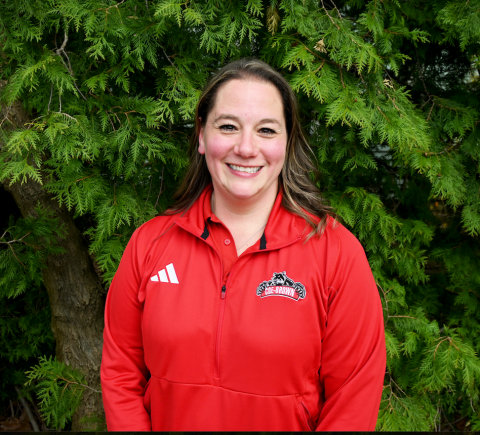
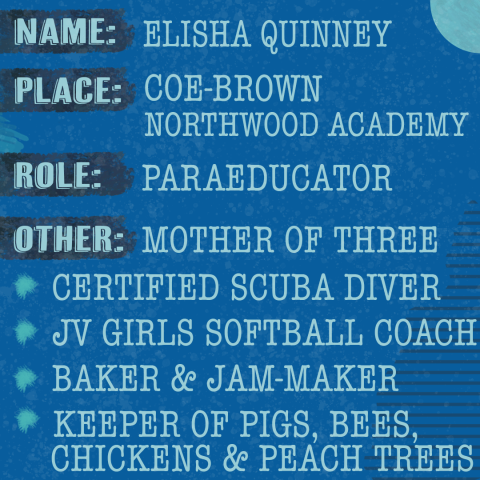
How did you get into education?
So the start of my career was not in education at all. I went to school to be a surgical tech. I started in the operating room and was working in the OR when I became pregnant with Seth, my first child. But the idea was always for me to stay home. So I was a little shy of 24 when I had him, and then I stayed home as I had my two other kids.
How did you transition back to work?
We were living in Middleton, New Hampshire at the time. I was homeschooling Seth and my oldest daughter, Judi, but there wasn’t going to be any homeschooling for my youngest, Alli. She just wasn’t that kind of kid. And there were signs that it was time for the other two to go to school, so they all started at Farmington Elementary.
We moved to Northwood halfway through Seth’s fifth-grade year, Judi’s third-grade year, and Alli’s first-grade year. It was the worst thing, and I would never move children between grades again. It was okay for the oldest two, but it was really disruptive for my youngest. There was just some kind of disconnect, and it was really tough for her to bounce back.
So once we moved, I started to volunteer in my youngest child’s classroom. I had already volunteered a little bit in Farmington, and then someone at the school suggested subbing. And I was like—I could do that. Get out a little bit. Have the same hours as the kids. Make a little extra money. So I started subbing at Northwood School, just a little bit here and there. And then a little bit turned into, you know, they needed me more. And then I started subbing more and more, and I really started to enjoy it.

At one point, they asked me if I would be willing to go into what they call the Partner Room at Northwood School. It’s actually the New England Center of Children—kind of like an outside source that comes in to work with children with high needs that are either on the spectrum or have other behavioral issues. And I was like—okay, you know, I'm not opposed to that. Typically substitutes don't go in there, but they gave me special training. I took the Applied Behavior Analysis (ABA) training and CALM, which is de-escalation training designed to help you move children from inclusion to a safe place with cubbies and padding on the walls. So it's a protective place for kids to go. They have their space and can calm down, and the idea is that eventually those skills translate and they can join the traditional classroom again.
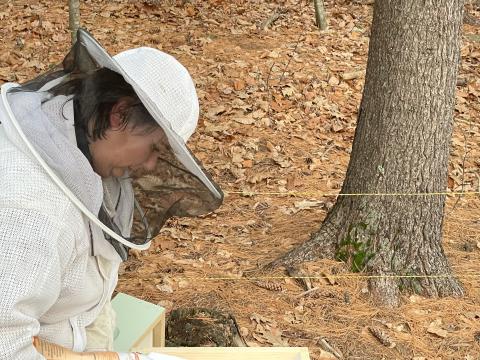
Did you work in the Partner Room for a long time?
At one point I took a full-time job, starting halfway through the year after a teacher left. I took over and enjoyed the work, but I didn’t go back the next year because my husband had just started his master’s program, and to work in the Partner Room you had to stay a little later. My kids were still too young to be home by themselves after school, and it just wasn’t going to work in terms of timing. So I went back to subbing where it was more flexible.
How did you transition to subbing at Coe-Brown Northwood Academy?
At one point someone suggested trying to sub at Coe-Brown because they paid better. It was $125 per day at the high school and $80 a day at the middle school. So I was like, “oh my goodness, it’s so intimidating, but maybe I should try this out?” So I applied and interviewed and started subbing at the high school when my son became a freshman.
Once I began subbing there and started to get more involved, I loved it. I almost didn’t look back. They started utilizing me more and more and I found I preferred it there.
What did you like about it?
Mostly, I liked the administration. It was so obvious that the administration backed the teachers and staff. So I knew that if I had any sort of problem, all I had to do was pick up the phone or write a text and Skidds would be there, the Assistant Headmaster. And I just knew that within a day the Headmaster was going to be in contact with me and ask what happened, and that there would be real follow-through. Real consequences for student actions. And that environment led to kids being a lot more respectful.
I also like being able to converse with little adults as opposed to kids. You can really see progress and feel like you’re making a difference. Like you can really impact lives.
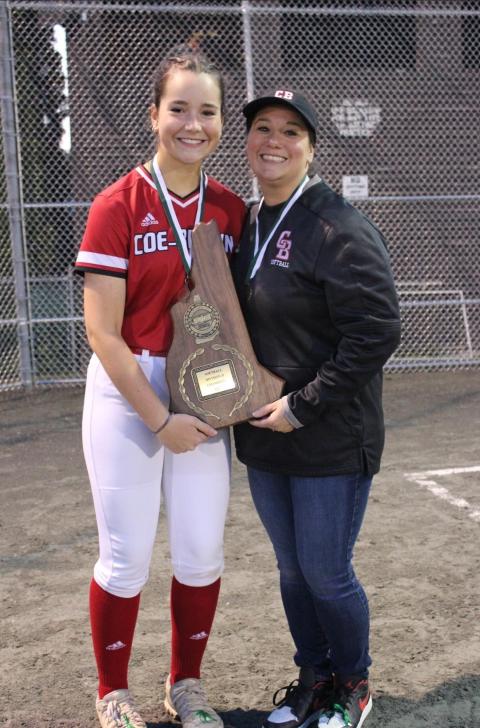
What was your favorite class to sub?
It sounds weird, but I love being in the PE classes. And I love being in the food classes. Because it’s Mandy Morales who does the foods, and she knows that I can handle anything. So when she leaves, she knows she can still leave a lab for me, like a cooking lab, and that it will be fine. That even though there are four kitchens, she trusts me enough to handle the kids and take notes so I can communicate with her afterwards and say, “this class or group did well, this happened with this group.” And she can still grade and move forward.
Coe-Brown has this concept with their subs that teachers will provide lesson plans and subs will carry them out, so the learning can continue. Like they don’t just leave a movie—they expect you to complete the lessons so there’s no break in education.
And I love doing the more active classes. I worked with one of the PE teachers at the middle school as well, so he knows I can jump in and do whatever needs to be done. I don’t mind being active or getting dirty—I just need to know what to wear that day. And I like the sciences, and with my science background the teachers know that I can jump in there as well.
When did you switch from subbing to being a full-time paraeducator?
Just this past year, so the beginning of this fall. Last year I was there almost every single week for five days as a sub, so it made sense to switch to officially full-time.
What does your schedule look like now?
We have a rotating schedule. So there are seven blocks, and one day it goes 1, 2, 3, 4, and the next day 5, 6, 7, 1, then the next 2, 3, 4, 5—like that. I’m still jumping around, but I always have the same schedule for the same block.
In Period 1 I work with a student one-on-one. In Period 2 I’m in a group setting, not with any particular student. In Period 3 I’m with a student one-on-one, but for health reasons, not academic ones. For Period 4 I’m in a science room that has a lot of IEPs, so I’m there for multiple students who can use assistance. In Period 5 I’m in a study hall working one-on-one, but I can also be available for any kid who needs extra support. Period 6 I’m with the same student as Period 1, and then in Period 7 I’m a one-on-one.
So it’s great. I love it. I get to know the kids but also tons of different teachers. And I really like being in lots of different classrooms and getting to interact with so many students. Some days are really challenging and a few of my kids equate me with things they don’t like to do, like reading or writing. But that’s okay. You don’t have to like me, but you’re still going to be educated.
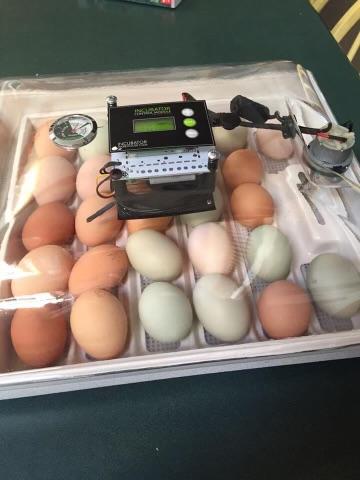
Was it a tough transition?
It’s been fun, actually. And my direct boss is amazing. She will ask us what we want, respect our strengths, and place us where we feel comfortable. And that's super helpful because if we're not strong in subject, then we can't be as helpful as we could in other areas. And that to me is so comforting. Because I'm not strong in math, so she doesn’t put me in a Calculus classroom because she knows that I’m not going to be able to help the students as much as I could somewhere else. So that’s been incredible, having a strong boss who values us and our strengths and opinions.
Are you going back for a second year as a para?
I am going back. I already signed my contract. But just this week I started going back to school to get my bachelor’s in special education. I'm hoping to be able to finish within a year since I have my associate's degree. There are some classes that I wasn’t able to transfer in, but I can take a lot during the summer.
And the hope is that I'll be able to get a teaching position at some point. I would love to stay at Coe-Brown if something becomes available.
Congrats on going back to school! What would be your dream job once you graduate?
I mean, my dream—if I could do anything—would be to be able to take over for Mandy Morales, the Cooking Teacher. She would love to concentrate more on early childhood development, and we’ve chatted. I would love for her to be able to dive into that interest and I could take over foods and focus on health and nutrition. Right now the PE teachers do health, but I would love to do both: food and health together.
Why are you focusing on Special Ed right now?
Well, I have a lot of experience with special ed. And special ed isn’t going away. It's only getting bigger. And the more we’re trained in it—the more teachers are aware and accustomed to providing support—the better teacher you’ll be no matter your subject. Because we’re always going to have special ed students in our classrooms, and you can utilize that same knowledge and skills with all students. It’s universal.
And within my dream job, I would love to teach life skills for special ed students, or really for any students. Like—hey, today we’re going to learn how to make grilled cheese sandwiches. Most kids know how to do this, but not every student has been giving the opportunity. Some haven’t been allowed in the kitchen. And they need these skills in order to be out on their own, whether it’s making grilled cheese or red sauce or opening a credit line or ironing a shirt. We can teach these small things in a classroom that help students become independent, really take the time to practice job interviews and teach students how to interact in a social setting. You know, let’s pretend to talk on the phone! Let’s learn how to sew on a button!
We don’t have these kinds of classes anymore, and so these topics are really overlooked. We all need them. We really do—these basic skills like phone etiquette and how to shake a hand. These are important things for kids to learn, especially if they have a harder time to begin in social settings.
What’s your favorite age to teach?
Freshmen are tough. They come in and they’re still so young. It really takes them until after Christmas to realize they’re not in middle school anymore. So I really like juniors and seniors. They get to this stage where they’re like—you know what? It's okay. I can be who I am. It's kind of heartbreaking when they leave, since they’re so fun at that age. They’ve realized that it’s okay to be who they are and are getting comfortable in their own skin. They’re so awesome, and it’s sad when they graduate.
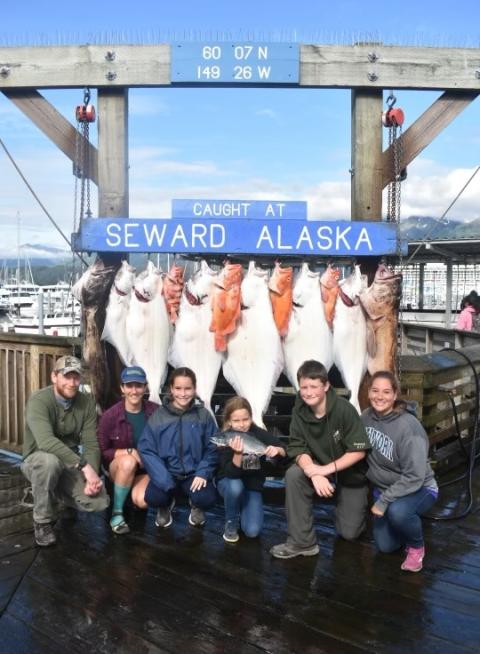
What do you think people don’t understand about the role of a paraeducator?
I think paras get a lot put on them. There are just a of expectations from coworkers and students and parents, and I think that people assume that we make a lot of money—but that’s just not true. Paras are definitely underpaid.
And there are paras who are highly educated with a ton of experience. Like we have one gentleman at Coe-Brown with a master’s degree in history. And he’s amazing. The kids know that if they have any questions about history, they can go to him. He really is amazing. And I asked him one day—why don't you teach? And he said, “well, I’m older now and no one would hire me, they would hire someone younger.” And it’s so sad to think that because he’s older he believes that he doesn’t have value. It’s heartbreaking.
It's not that teachers undervalue paras. I don’t think that’s the case at all. I feel very valued by my colleagues. But in general, I don’t know if the public realizes the value of a paraeducator.
What are the best and worst parts of the job right now?
I think the worst part of my job is unrealistic expectations from the parents. For some of the parents, not all, the expectations for what a paraeducator can do is just too high.
And the best part for me right now is my teacher colleagues. I think they're great. I’m treated very well, and I feel very valued. I feel valued from the administration. I feel valued from my immediate supervisor. She's always telling us she appreciates us. And I like my colleagues. I like going to work.
I know that’s not true at other places, in other schools. But I think the group of people I work with is just incredible—the other paras and the teachers and the Admin. I just love it at Coe-Brown. I wouldn’t want to work anywhere else. And the teachers—they’re great. I joke with them all the time. One teacher I work with is always joking about how she’s going to vote me the worst para in the world. But I know she’s kidding—it’s like my big sister harassing me. I mean, she got me a Christmas present! You know what I mean? We’re close, and it’s just so nice to feel comfortable and connected, and I love that we can trust each other and have this banter back-and-forth. She’s had all three of my kids and is always asking about them. I just love my community.
